(完整)英语写作复习笔记
- 格式:pdf
- 大小:235.37 KB
- 文档页数:6
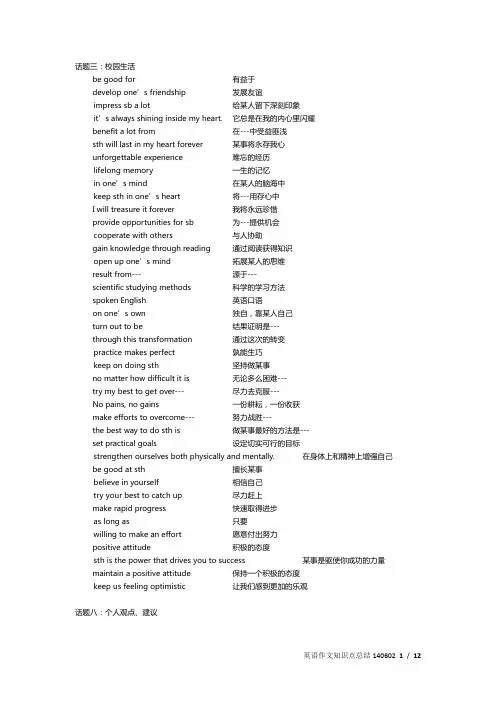
话题三:校园生活be good for 有益于develop one’s friendship 发展友谊impress sb a lot 给某人留下深刻印象it’s always shining inside my heart. 它总是在我的内心里闪耀benefit a lot from 在---中受益匪浅sth will last in my heart forever 某事将永存我心unforgettable experience 难忘的经历lifelong memory 一生的记忆in one’s mind 在某人的脑海中keep sth in one’s heart 将---用存心中I will treasure it forever 我将永远珍惜provide opportunities for sb 为---提供机会cooperate with others 与人协助gain knowledge through reading 通过阅读获得知识open up one’s mind 拓展某人的思维result from--- 源于---scientific studying methods 科学的学习方法spoken English 英语口语on one’s own 独自,靠某人自己turn out to be 结果证明是---through this transformation 通过这次的转变practice makes perfect 孰能生巧keep on doing sth 坚持做某事no matter how difficult it is 无论多么困难---try my best to get over--- 尽力去克服---No pains, no gains 一份耕耘,一份收获make efforts to overcome--- 努力战胜---the best way to do sth is 做某事最好的方法是---set practical goals 设定切实可行的目标strengthen ourselves both physically and mentally. 在身体上和精神上增强自己be good at sth 擅长某事believe in yourself 相信自己try your best to catch up 尽力赶上make rapid progress 快速取得进步as long as 只要willing to make an effort 愿意付出努力positive attitude 积极的态度sth is the power that drives you to success 某事是驱使你成功的力量maintain a positive attitude 保持一个积极的态度keep us feeling optimistic 让我们感到更加的乐观话题八:个人观点、建议decide not to goLast but not least,It’s always necessary to think carefully before making a decision.No man is an island, as the saying goes: a man without friends is an angel without wings. I am sure I can fly higher and farther with the wings of friendshipIt can not only help us succeed in our study, but also help us grow up as a personit’s important for us toone of my best subjectsmake some notescatch every chance toboth in and out of classI’m not afraid ofI believe that nothing is impossible if I put my heart into it.It’s good forI think you had betterhave done a lot for uslook down upongive a hand to话题三:校园生活is strict with sbIt’s good for sthhad better to dobe pleasedhave a great progressearned aboutbe activebe brave enough toget on well withtake part in allI had tofit in with othersget used to doinglearn from each otherI’m suremake great progress in sth话题七:环境、健康more and moreI was glad tovolunteer their time to domake ……environment betterpicked upcalling onlead a low-carbon lifeI was moved byThe environmental protection is not only the business of the government, but also the responsibility of each of us. Even a small effort can make a great differenceI made up my mind toturn offkeep the water runningreusing some old thingsI plan totake part inbreathe the fresh airkeep away fromdo a bit fortake care ofin this waybecoming worse and worsewe should go to school on foot or by bus instead of going by carin timebe reused as much as possibleIt’s our duty to havetake actions to offer their help话题四:课外生活I’m glad to hear from youshow you around somewheretell you abouttake you tolisten tobe different kinds offall in love withI plan to have a bus tourenjoy the sights of Beijingget offfeel the perfect mixture of the past and the present.you're always welcomeat presenttrying to do their bestprotect the environment for longAs a resultit’s lucky for sb to do sthare good forcommunicate withimportant to doon timekeep promiseslie to othersbe polite to othershelp people in needwe’d betterDon’t throw litter or spit aboutobey traffic rulespay attention to studyYou’d betterWork hard on your lessonsenjoy myselfso thatvery helpful todo sports话题五:假期安排I had tofit in with othersget used to doing sthlearn from each otherI’m suremake great progress in sth话题六:节假日活动can brighten that person’s day.so nervous thatsitting in the front rowI was greatly encouraged by his smilesomething so simple can make a big difference.In the lake of my memories话题:寒假打算what we students are looking forward to is--- 我们学生所期待的是--- look forward to sth/doing sth 期待某事In the first place 首先be supposed to do sth 被要求应当作某事devote oneself to/into sth/doing sth 投身于某事enjoy the fantastic scenery of--- 享受美丽的风景proper relaxation 适当的放松话题:志愿服务devote oneself to sth 投身于什么之中I am experienced in doing sth 我在做某事上有经验sb will be delighted 谁谁一定会开心put sth to good use by doing sth 通过某事而好好利用---with enough patience, I bet I can 拥有足够的耐心, 我确信我能---sb will be qualified to do sth 某人将有能力做某事I don’t mind --- 我不介意什么什么benefit both A and B 使A和B都受益cherish sth 珍惜----instead of 取而代之,相反doing A instead of doing B will make --- more meaningful 与其做A 不如做B让---更有意义Tired but happy, I cherish it a lot. Advantages far outweigh the disadvantages. 很累但是很快乐,我很珍惜这次经历。
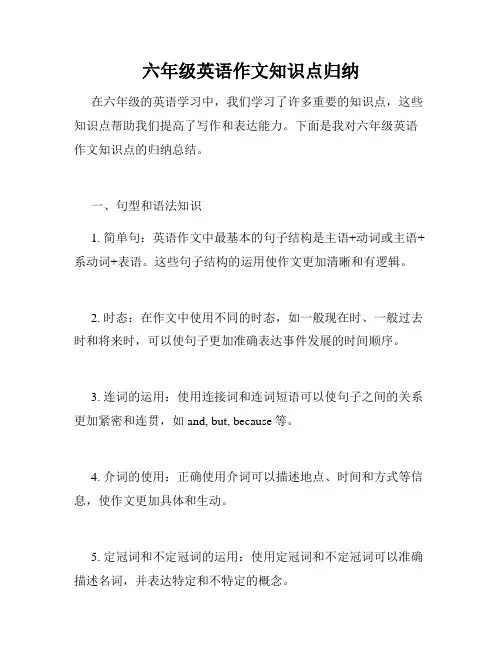
六年级英语作文知识点归纳在六年级的英语学习中,我们学习了许多重要的知识点,这些知识点帮助我们提高了写作和表达能力。
下面是我对六年级英语作文知识点的归纳总结。
一、句型和语法知识1. 简单句:英语作文中最基本的句子结构是主语+动词或主语+系动词+表语。
这些句子结构的运用使作文更加清晰和有逻辑。
2. 时态:在作文中使用不同的时态,如一般现在时、一般过去时和将来时,可以使句子更加准确表达事件发展的时间顺序。
3. 连词的运用:使用连接词和连词短语可以使句子之间的关系更加紧密和连贯,如and, but, because等。
4. 介词的使用:正确使用介词可以描述地点、时间和方式等信息,使作文更加具体和生动。
5. 定冠词和不定冠词的运用:使用定冠词和不定冠词可以准确描述名词,并表达特定和不特定的概念。
二、写作技巧和表达方式1. 描述事物外貌:使用形容词和副词来描述事物的外貌特征,如尺寸、颜色、形状等,使读者能够直观地了解所描述的事物。
2. 描述感受和情感:通过使用形容词和副词,以及感叹句来表达个人的感受和情感,丰富作文的表达方式。
3. 给出理由和解释:在作文中,可以使用because引导的句子来给出理由和解释,使作文更加有说服力和逻辑。
4. 排比句和并列句的应用:使用排比句和并列句可以强调相同的事物或并列的观点,使文章结构更加紧凑和有层次感。
5. 使用插入语:通过使用插入语,如副词、短语或从句来添加额外的信息,使作文更加丰富和有趣。
三、写作题材和实用句型1. 介绍自己:使用一般现在时和一般过去时来介绍自己的姓名、年龄、家庭、兴趣爱好等。
2. 描述事物:使用形容词和副词来描述事物的外貌和特征,如描述动物、水果、食物等。
3. 叙述经历:使用一般过去时和适当的过渡词来叙述个人或他人的过去经历,如参加活动、旅行、生日等。
4. 提出建议:使用情态动词和建议句型来给予建议和提出解决问题的方法。
5. 表达喜好和意见:使用形容词和副词来表达个人的喜好和意见,如喜欢的食物、运动、电影等。
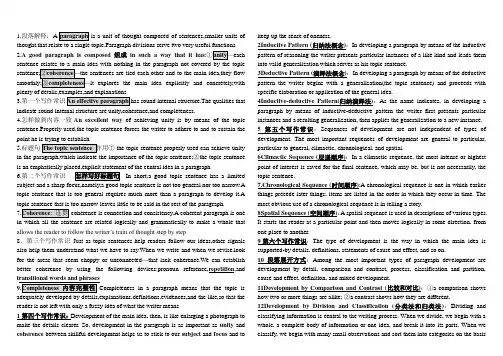
1.段落解释:is a unit of thought composed of sentences,smaller units of thought,that relate to a single topic.Paragraph divisions serve two very useful functions 2.A good paragraph is composed 组成 in such a way that it has :eachidea with nothing in the paragraph not covered by the topicit explores the main idea explicitly andconcretely,with plenty of details,examples,and explanations3.has sound internal structure.The qualities that indicate sound internal structure are unity,coherence,and completeness.4.怎样做到内容一致An excellent way of achieving unityis by means of the topic sentence.Properly used,the topic sentence forces the writer to adhere to and to sustain the point he is trying to establish5.标题句 the topic sentence properly used can achieve unity in the paragraph,which indicate the importance of the topic sentence;②the topic sentence6.第二个写作常识In short,a good topic sentence has a limited subject and a sharp focus,namely,a good topic sentence is not too general nor too narrow.A topic sentence that is too general requires much more than a paragraph to develop it.A coherence is connection and consistency.A coherent paragraph is one in which all the sentence are related logically and grammatically to make a whole that allows the reader to follow the writer’s train of thought step by step8.第三个写作常识 Just as topic sentenceshelp readers follow our ideas,other signals also help them understand what we have to say.When we write and when we revise,look for the areas that seem choppy or unconnected —that lack coherence.We can establish better coherence by using the following devices:pronoun reference,repetition ,and in a paragraph means that the topic is adequately developed by details,explanations,definitions,evidences,and the like,so that the reader is not left with only a fuzzy idea of what the writer means1第四个写作常识:Development of the main idea, then, is like enlarging a photograph to make the details clearer. So, development in the paragraph is as important as unity and coherence between skillful development helps us to stick to our subject and focus and to keep up the sense of oneness.2Inductive Pattern (归纳法概念):In developing a paragraph by means of the inductive pattern of reasoning the writer presents particular instances of a like kind and leads them into valid generalization which serves as his topic sentence.3Deductive Pattern (演绎法概念):In developing a paragraph by means of the deductive pattern the writer begins with a generalization(the topic sentence) and proceeds with specific elaboration or application of the general idea.4Inductive-deductive Pattern(归纳演绎法):As the name indicates, in developing a paragraph by means of inductive-deductive pattern the writer first presents particular instances and a resulting generalization, then applies the generalization to a new instance. 5第五个写作常识:Sequences of development are not independent of types of development. The most important sequences of development are general to particular, particular to general, climactic, chronological, and spatial.6Climactic Sequence (层递顺序):In a climactic sequence, the most intense or highest point of interest is saved for the final sentence, which may be, but is not necessarily, the topic sentence.7.Chronological Sequence (时间顺序):A chronological sequence is one in which earlier things precede later things; items are listed in the order in which they occur in time. The most obvious use of a chronological sequence is in telling a story. 8Spatial Sequence (空间顺序):A spatial sequence is used in descriptions of various types. It starts the reader at a particular point and then moves logically in some direction, from one place to another.9第六个写作常识:The type of development is the way in which the main idea is supported-by details, definitions, statements of cause and effect, and so on.10段落展开方式:Among the most important types of paragraph development are development by detail, comparison and contrast, process, classification and partition, cause and effect, definition, and mixed development.11Development by Comparison and Contrast (比较和对比):①a comparison shows how two or more things are alike; ②a contrast shows how they are different.12Development by Division and Classification (分类法和归类法):Dividing and classifying information is central to the writing process. When we divide, we begin with a whole, a complete body of information or one idea, and break it into its parts. When we classify, we begin with many small observations and sort them into categories on the basisof their similarities.13第七个写作常识:Causal analysis involves the ability to see cause and effect relationships between two elements. In order to arrive at a cause, we need to distinguish among three kinds: necessary, sufficient and contributory.14第八个写作常识:Definitions are particularly important for limiting the intended meaning of abstract or technical terms. There are two types of definition: formal definition and extended definition. Formal definition includes the term itself, the class it belongs to, and the details that distinguish it from other items in its class.15第九个写作常识:As we have seen, a single paragraph often contains more than one type of development. Almost any kind of paragraph may include examples or illustrations. The important thing is to avoid switching abruptly and apparently without reason from one kind of development to another in the middle of a paragraph.16第十个写作常识:The introduction is probably the most important part of an essay. The introduction should agree in tone and style with the rest of the essay. It should be a natural part of it, not a different construction grafted on the top.。
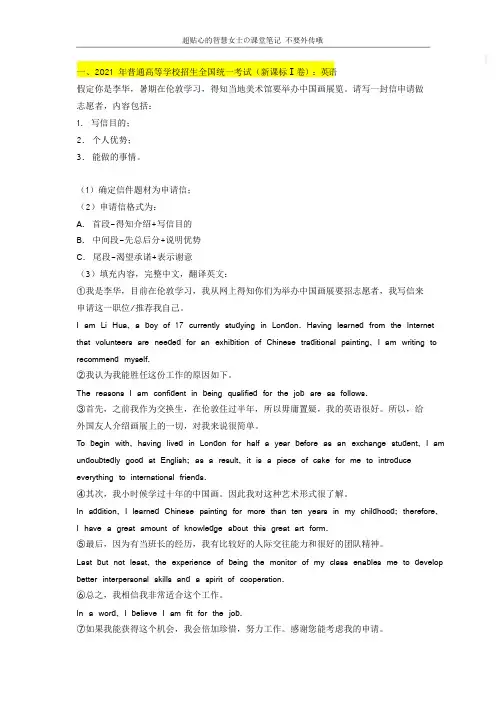
1 一、2021 年普通高等学校招生全国统一考试(新课标Ⅰ卷):英语假定你是李华,暑期在伦敦学习,得知当地美术馆要举办中国画展览。
请写一封信申请做志愿者,内容包括:1. 写信目的;2. 个人优势;3. 能做的事情。
(1)确定信件题材为申请信;(2)申请信格式为:A. 首段-得知介绍+写信目的B. 中间段-先总后分+说明优势C. 尾段-渴望承诺+表示谢意(3)填充内容,完整中文,翻译英文:①我是李华,目前在伦敦学习,我从网上得知你们为举办中国画展要招志愿者,我写信来申请这一职位/推荐我自己。
I am Li Hua, a boy of 17 currently studying in London. Having learned from the Internetthat volunteers are needed for an exhibition of Chinese traditional painting, I am writing to recommend myself.②我认为我能胜任这份工作的原因如下。
The reasons I am confident in being qualified for the job are as follows.③首先,之前我作为交换生,在伦敦住过半年,所以毋庸置疑,我的英语很好。
所以,给外国友人介绍画展上的一切,对我来说很简单。
To begin with, having lived in London for half a year before as an exchange student, I am undoubtedly good at English; as a result, it is a piece of cake for me to introduceeverything to international friends.④其次,我小时候学过十年的中国画。
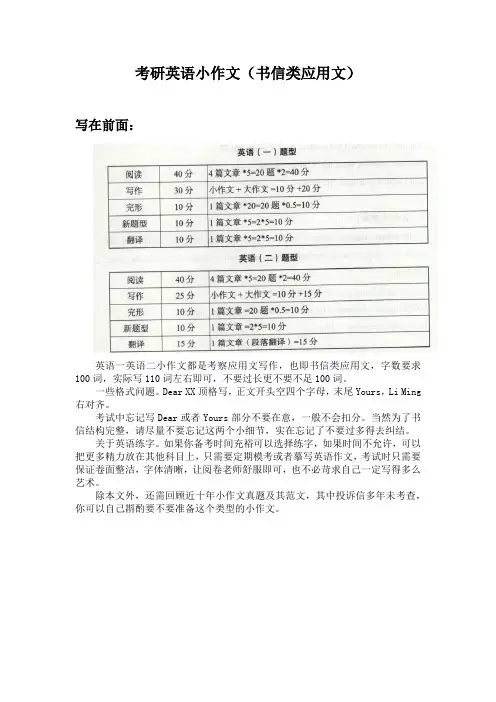
考研英语小作文(书信类应用文)写在前面:英语一英语二小作文都是考察应用文写作,也即书信类应用文,字数要求100词,实际写110词左右即可,不要过长更不要不足100词。
一些格式问题。
Dear XX顶格写,正文开头空四个字母,末尾Yours,Li Ming 右对齐。
考试中忘记写Dear或者Yours部分不要在意,一般不会扣分。
当然为了书信结构完整,请尽量不要忘记这两个小细节,实在忘记了不要过多得去纠结。
关于英语练字。
如果你备考时间充裕可以选择练字,如果时间不允许,可以把更多精力放在其他科目上,只需要定期模考或者摹写英语作文,考试时只需要保证卷面整洁,字体清晰,让阅卷老师舒服即可,也不必苛求自己一定写得多么艺术。
除本文外,还需回顾近十年小作文真题及其范文,其中投诉信多年未考查,你可以自己斟酌要不要准备这个类型的小作文。
08真题(英语一):道歉+建议信Directions:You have just come back from Canada and found a music CD in your luggage that you forgot toreturn to Bob, your landlord there. Write him a letter to1)make an apology, and2)suggest a solution例文:Dear Bob:开头:我写此信的目的是为了向你道歉。
在离开加拿大时,我忘了把那盘披头⼠士乐队的CD还给你。
走的时候太匆忙了,我把所有东西都塞到⼠行李中,没有仔细检查。
当时要是多加注意的话,就不会犯这种低级错误了。
I’m writing to apologize for having forgotten to return the “the Beatles”CD to you when I left Canada. I was in such a hurry that I packed everything in my luggage without checking carefully. Had I paid more attention then, I wouldn’t have made such a stupid mistake.第二段:因为我知道你特别珍爱那盘CD,所以⼠一定要想办法解决这个问题。

英文写字知识点总结IntroductionWriting is an important skill that is essential for successful communication in today's fast-paced world. Whether it's an essay, a report, a letter, or an email, the ability to write well can make a significant difference in how you are perceived and the impact of your message. In this comprehensive guide, we will cover all the essential knowledge and techniques for improving your writing skills to help you become a more effective and confident writer.Understanding the Writing ProcessBefore we dive into specific writing techniques, it's important to understand the writing process as a whole. Writing is not just about putting words on paper; it involves a series of steps that require careful planning and organization. The writing process typically consists of the following stages:1. Pre-writing: This stage involves brainstorming, researching, and organizing ideas before putting them into writing. It's important to have a clear understanding of the topic and audience at this stage.2. Drafting: In this stage, you start writing your first draft, focusing on getting your ideas down on paper without worrying too much about grammar or structure.3. Revising: After completing the first draft, you should revise and edit your work to improve clarity, coherence, and effectiveness. This stage may involve rewriting, reorganizing, and refining your content.4. Editing: In this stage, you focus on correcting grammar, punctuation, spelling, and other language mechanics to ensure that your writing is error-free.5. Publishing: The final stage involves sharing your writing with your intended audience, whether it's through printing, emailing, or publishing online.Mastering the writing process is essential for producing high-quality writing, so it's important to pay careful attention to each stage and refine your skills accordingly. Developing a Strong Writing StyleEvery writer has their own unique style, which is a reflection of their personality and voice. However, developing a strong writing style involves more than just personal expression; it also involves clarity, coherence, and persuasiveness. Here are some key elements to consider when developing your writing style:1. Clarity: Good writing is clear and easy to understand. Use simple and direct language to convey your ideas, and avoid unnecessary jargon or complex sentences. Make sure your writing is easy to follow and free of ambiguity.2. Coherence: Coherence refers to the logical flow and organization of your writing. Make sure your ideas are well-structured and connected, and use transitions and logical markers to guide your readers from one point to the next.3. Persuasiveness: Whether you're writing an argumentative essay or a persuasive business proposal, the ability to persuade your audience is crucial. Use evidence, logic, and rhetorical techniques to make your case and convince your readers.4. Tone: The tone of your writing sets the mood and attitude of your message. Whether it's formal, informal, serious, or lighthearted, your tone should be appropriate for your audience and purpose.5. Voice: Your writing voice is your unique personality and style as a writer. Develop a distinct voice that reflects who you are and what you stand for, but also be adaptable to different writing situations and genres.Improving Writing MechanicsIn addition to developing a strong writing style, it's important to pay attention to writing mechanics, including grammar, punctuation, spelling, and usage. Even the most compelling ideas can be undermined by poor writing mechanics, so it's crucial to master the following aspects:1. Grammar: Grammar refers to the rules and principles that govern the structure of sentences and phrases. Mastering grammar involves understanding parts of speech, sentence structure, subject-verb agreement, and other language rules.2. Punctuation: Punctuation marks such as commas, periods, semicolons, and quotation marks are essential for clarifying the meaning of sentences and organizing your writing. Use punctuation correctly to avoid confusion and improve readability.3. Spelling: Proper spelling is crucial for conveying your ideas accurately and professionally. Pay attention to commonly misspelled words and practice using a dictionary or spell-checker to catch spelling errors.4. Usage: Usage refers to the proper choice of words and phrases in your writing. Pay attention to common usage errors such as affect/effect, than/then, and its/it's, and use language resources to improve your usage.5. Style Guides: For more formal writing, it's important to follow a recognized style guide such as the APA, MLA, or Chicago Style. These guides provide specific rules for writing and formatting academic papers, reports, and other documents.By improving your writing mechanics, you can enhance the clarity and professionalism of your writing, making it more effective and impactful.Practicing Writing SkillsLike any other skill, writing requires practice and dedication to improve. Here are some effective strategies for practicing and honing your writing skills:1. Freewriting: Freewriting involves writing without stopping or censoring yourself for a set period of time. This exercise can help you generate ideas, overcome writer's block, and tap into your creativity.2. Journaling: Keeping a journal is a great way to practice writing on a regular basis, as it allows you to express your thoughts, feelings, and experiences in a personal and informal setting.3. Writing Prompts: Using writing prompts or exercises can help you focus on specific skills such as descriptive writing, narrative writing, or persuasive writing. You can find a variety of writing prompts online or create your own.4. Feedback: Seek feedback from peers, mentors, or writing groups to get constructive criticism and suggestions for improvement. Having an outside perspective can help you identify blind spots and areas for growth.5. Revision: Don't be afraid to revise and rewrite your work multiple times. The more you revise, the more you can refine your writing and make it stronger and more effective.By practicing these strategies regularly, you can develop your writing skills and become a more confident and proficient writer.ConclusionWriting is a skill that can be learned and improved with time and practice. By understanding the writing process, developing a strong writing style, mastering writing mechanics, and practicing regularly, you can become a more effective and confident writer. Whether you're a student, a professional, or a creative writer, the ability to communicate clearly and persuasively through writing is a valuable asset that can open doors and create opportunities in every aspect of your life. So, take the time to invest in your writing skills and watch as your words become more powerful and impactful.。

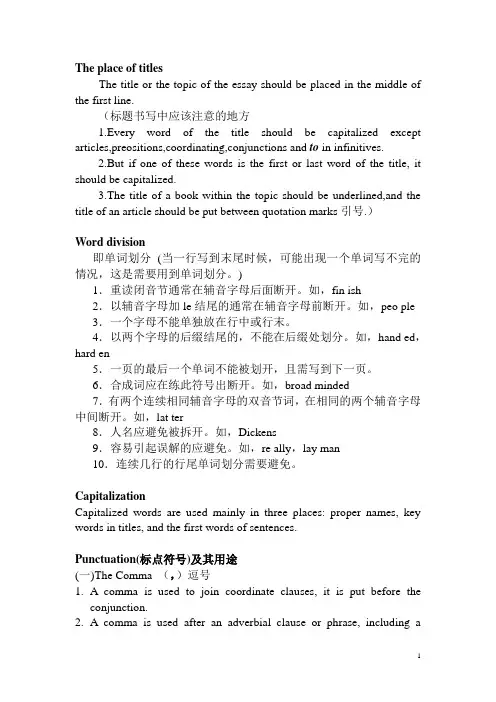
The place of titlesThe title or the topic of the essay should be placed in the middle of the first line.(标题书写中应该注意的地方1.Every word of the title should be capitalized except articles,preositions,coordinating,conjunctions and to in infinitives.2.But if one of these words is the first or last word of the title, it should be capitalized.3.The title of a book within the topic should be underlined,and the title of an article should be put between quotation marks引号.)Word division即单词划分(当一行写到末尾时候,可能出现一个单词写不完的情况,这是需要用到单词划分。
)1.重读闭音节通常在辅音字母后面断开。
如,fin ish2.以辅音字母加le结尾的通常在辅音字母前断开。
如,peo ple 3.一个字母不能单独放在行中或行末。
4.以两个字母的后缀结尾的,不能在后缀处划分。
如,hand ed,hard en5.一页的最后一个单词不能被划开,且需写到下一页。
6.合成词应在练此符号出断开。
如,broad minded7.有两个连续相同辅音字母的双音节词,在相同的两个辅音字母中间断开。
如,lat ter8.人名应避免被拆开。
如,Dickens9.容易引起误解的应避免。
如,re ally,lay man10.连续几行的行尾单词划分需要避免。
CapitalizationCapitalized words are used mainly in three places: proper names, key words in titles, and the first words of sentences.Punctuation(标点符号)及其用途(一)The Comma (,)逗号1.A comma is used to join coordinate clauses, it is put before theconjunction.2.A comma is used after an adverbial clause or phrase, including aprepositional and a participial phrase before the subject, or inserted in the middle of the sentence.mas are used to separate a series of words or phrases with thesame function in the sentence:4.Nonrestrictive clauses and phrases are set off by commasmas set off parenthetical elements6.In dates, a comma is used to separate the day and the year if the orderis month—day—year; no comma need be used if the order is day—month—year.7.With numbers of 1 000 or over, commas or little blank spaces may beused to separate digits by thousands. Form right to left, a commas is placed after every three numerals.(二)The Period (. )句号1.The period is used at the end of a declarative sentence, a mildlyimperative sentence, and an indirect question.2.The period is used with most abbreviations.3.Three spaced period make the ellipsis mark, which indicates theomission of one or more words within a quoted passage.(三)The Semicolon (;)分号1.The semicolon is used between two coordinate clauses which are notlinked by a conjunction.2.Conjunctive adverbs like therefore, however, nonetheless, hence,otherwise, besides, moreover, etc., should not be used as conjunctions to link two coordinate clauses, before them there should be a semicolon, not a comma.3.The semicolon is used with conjunctions when the clauses containinternal punctuation.4.The semicolon is used to separate a series of items with internalcommas.5.A semicolon may be used to join clauses with words omitted, and theomission is sometimes indicated by a comma.(四)The Colon (:)冒号1.The colon is used to introduce a quotation or a statement.2.The colon is used to introduce an examination, a summary, or anappositive.3.The colon is used between the hour and the minute to show the time,to record the scores of games, to end the salutation of a business letter and the introductory remark of a spealer to the chairman and audience.(五)The Question Mark (?)问号1.The question mark is used after a direct question.2.The question mark is used after a statement turned into a question.3.A question mark put between parentheses indicates the writer’suncertainty about the correctness of the preceding word, figure or date.(六)The Exclamation Mark (!)叹号1.The exclamation mark is used after an exclamatory sentence, or anemphatic interjection, or a phrase expressing strong emotion..2.Sometimes the exclamation mark is used after a slogan.(七)Quotation Marks(…)引号1.Double quotation marks are used to enclose direct quotations indialogue or from books or articles.2.Single quotation marks are used to enclose a quotation within aquotation.3.Indirect quotations are not enclosed by quotation marks.4.Quotation marks are used for titles of articles, essays, short stories,short poems, songs, etc., and for headings of chapters or subdivisions of books. Titles of books, newspapers and magazines are generally underlined or italicized.5.Words with special meaning are sometimes put between quotationmarks,(八)Parentheses/Brackets (())圆括号1.Parentheses are used to set off parenthetical, supplementary, orillustrative words.2.Parentheses enclose figures or letters used for enumeration.(九)Square Brackets(【】)方括号1. Square Bracketsare used to indicate corrections or explanations in quoted matter made by the writer who is quoting .2. Square Brackets are used instead of parentheses within parentheses.(十)The Dash (—)破折号1.The dash indicates a break in thought or a change in tone, or aspeaker’s confusion or he sitation.2.The dash indicates an unfinished or interrupted statement.3.A pair of dashes set off a parenthetical element.4.The dash is sometimes used to introduce a summarizing clause after aseries of nouns.5.The dash is sometimes used just like quotation marks in a dialogue.6.The dash may be used to introduce subheadings and authors afterquotations.(十一)The Slash (/ )间隔号1.The slash indicates alternatives, representing the word or or and\or2.The slash is used to separate lines in short quotations of poetry beingquoted in running text.3.When fractions are written in a sentence, a slash is used to separate thenumerator from the denominator.4.Sometimes the slash means “per.”四种句型及其用途Comma逗号——declarative sentence(陈述句):makes an assignment or statementQuestion mark问号——direction question sentence(疑问句):ask a questionExclamation mark叹号——Imperation sentence(祈使句):express a command or a request Exclamatory sentence(感叹句):express a strong feeling or emotionUnderlining and italics1.Titles of books, periodicals, newspaper, plays, movies, operas, andlong poems are underlined or italicized.2.Foreign words are often underlined or italicized.3.Words and letters referred to as such are underlined or italicized.s of ships, aircraft and tragic sinking of the titanic.5.Sometimes underlining or italicizing indicates emphasis.【Words】一、Type of wordsCommon wordsFormal and technical words:(political,legal,scientific,technical,bussiness,literary)Nonstandard words:(slang,jargon,dialectal and obsolete)二、Choice of wordse common or informal words for general purposes; use formal ornonstandard when only on special occasions or for special purposes. e specific and concrete words when giving details; use general orabstract words when making summaries.e idiomatic expressions and words in acceptable collocations; avoidcombinations and that are unidiomatic.4.When there are synonyms, choose the word that expresses themeaning most exactly and that suits the content and style.三、SynonymsThe english language is very rich in synonyms. This is partly due to the fact that english has over the centuries borrowed or absorbed tens of thousands of words from other languages, mainly Greek, Latin and French. Word of anglo-saxon origin are generally colloquial or informal, and they form a great part of the vocabulary that people use daily. Many of the words of greek, latin, and french origin are formal, learned or “big”; and are mainly used in formal writing or speech.四、Some good dictionaries1.Longman dictionary of contemporary english2.Oxford advanced learner’s dictionary of current english.3.Webster’s new word dictionary.4.Collins cobuild english language dictionary.【Sentences】一、Composed sentences 构建句子:①complete structure②begin with a capital letter③full stop, or a question mark, or an exclamation mark④a single complete idea二、Requirement of correct sentences及其对应错误pleteness in structure—fragment in structure2.the right subject—the wrong subject3.agreement between the subject and the predicate verb—disagreement between the subject and the predicate verb 4.agreement between pronoun and antecedent—disagreement between pronoun and antecedent5.clear pronoun reference—unclear pronoun reference6.ending sentences with full stops—ending sentences with no full stops7.joining clauses with conjuctions—joining clauses with no or wrong conjuctions8.a main claus in a complex sentence—no main claus in a complex sentence9.proper use of comparisons—improper use of comparisons10. correct use of the tenses—incorrect use of the tenses四、Quality of effective sentencesEffective sentences have the following quality:Unity(完整性)Coherence(连贯性)Conciseness(简明扼要性)Emphasis(强调)( ways of emphasis:placing, climactic sequence, subordination,the use of verbs in the active voice,balanced sentences平行结构,periodic sentences圆周句,negative/positive sentences,rhetorical question,loose sentences松散句)Variety(表达多样性)五、The difference between subordination and coordinationCoordination is tipically realized by coordinators which join units at the same level while subodination is realized by subordinators which distinguish the superodinate claus and the inferior clause.【Paragraph】一、Ways of developing a paragraphThere are many possible ways to develop a paragraph.(1)development by time(2)development by process(3)development by space(4)development by examples or generalization(5)development by comparison and contrast:(the difference between comparison and contrast :When we compare one thing with another, we show the similarities;when we contrast one thing with another, we show dissimilarities.) (6)development by cause and effect(7)development by classification(8)development by definition(9)development by combination of methods二、The steps of developing a paragraphFirst, think of the topic or theme or main idea,And express it in a complete sentence(topic sentence).Then think of the details or examples or facts that may be used to support or explain the main idea.Work out the outline and arrange them in logical order.三、Features of a paragraphA effective paragraph must have a control idea, and this central idea may be expressed either explicitly in a topic sentence.【Summray】一、Definition (定义)A sumary is the gist or main theme of a piece of a piece of writing expressed in as few words as possible .it should be clear ,brief,and complete,with all the essential points included.二、Uses(用途)①summary writing enables people to get more out of their reading.②summary writing is also a very good exercise to teach us to express thoughts clearly,concisely and effectively.③summary writing has great practical value on grasping quikly and accurately what is read or heard.三、Procedure(步骤)⑴ reading⑵ writing⑶ revision四、Requirements(要求)A.we should be sure of the word limit required .B.we should use our own words to write a summary.C.we should convey the message fully and clearly.D. We should write in the logical order of the original passage.E. Compression (压缩)五、Ways(方法)A. Ommit the details 删除细节B. Reduce the examples 削减例子C. Refuse repeatness 避免重复D. Simplify the decription 简化描述E. Comprise wordy 全面用词F. Generable words 多用泛词e the shortest transitions 最简洁的过渡词H.inderect speech 间接引语【Composition 】一、Steps in writing a composition1.planning a composition( ① putting down all the relevant facts② thinking of a proper theme and deciding on our purpose③ re-examing our list of details and outlining )2.writing the fist draft3.revising the first draft4.making the final copy二、Parts in composition1. the beginning ——introduction(Ways of start a composition :start with …① relevant background material② the time and place of the event to be described③ a quotation④ a question⑤ a statement⑥ a figures or statistics⑦ a definition )2. the middle ——body3.the end ——conclusion三、Types of writing1.narration 记叙体2.exposition 说明文四、Criteria of a good composition (一篇好文章的标准)A good composition have something interesting and/or important,and if possible, something new , to say and that this “something”is expressed clearly, accurately, and appropriately. And we must decide on the purpose and audience of our writing and try to adapt the style and language to suit our purpose and audience.【Outline】一、Types of outline1. sentence outline: made up of sentences2.topic outline:consists of nouns and their modifiers, or their equivalents( =gerund phrases or infinitive phrases )二、Rules for writing outlinesIf we examine closely the two outline above, we may see that they follow these rules:(1)if there is a major point marked “Ⅰ”, there must be at least another marked “Ⅱ”;if there is an “a”, there must be a “b”, and so on.(2)a topic outline is written in noun phrase, and a sentence outline, in sentences. Sentences and phrase are not used together in the same outline. (3)parallel structure are used for the headings of the same rank. Subheads of like rank are of equal importance and are related to the heading and arranged in logical order.(4)the thesis is a complete declarative sentence, usually in the affirmative. It is not a question, a phrase, or a dependent clause, but one sentence which expresses our controlling idea.。
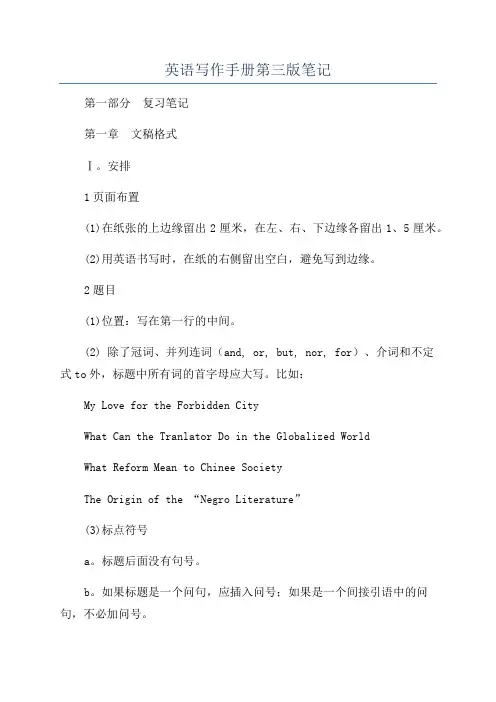
英语写作手册第三版笔记第一部分复习笔记第一章文稿格式Ⅰ。
安排1页面布置(1)在纸张的上边缘留出2厘米,在左、右、下边缘各留出1、5厘米。
(2)用英语书写时,在纸的右侧留出空白,避免写到边缘。
2题目(1)位置:写在第一行的中间。
(2) 除了冠词、并列连词(and, or, but, nor, for)、介词和不定式to外,标题中所有词的首字母应大写。
比如:My Love for the Forbidden CityWhat Can the Tranlator Do in the Globalized WorldWhat Reform Mean to Chinee SocietyThe Origin of the “Negro Literature”(3)标点符号a。
标题后面没有句号。
b。
如果标题是一个问句,应插入问号;如果是一个间接引语中的问句,不必加问号。
c。
标题中被引用的部分应该加引号。
d。
书名应斜体显示或下划线标注。
3缩进每段开头缩进4至5个字母。
在文件的右上角使用阿拉伯数字标明(不带括号或句号);可以不标明第一页。
5标点(1)逗号、句号、分号、冒号、问号和感叹号不得在行首使用,但必要时可在行尾使用。
(2)方括号和圆括号以及逗号的前半部分不得在行尾使用。
(3)连字符应在行尾使用。
Ⅱ。
大写大写字母主要用在句首,包含实词的标题,以及专有名词中。
1句子开头(1)完整的句子和作为句子使用的不完整的句子都应以大写字母开头。
(2)当引用语为完整的句子时,也应用大写字母开头,例如:She added, “My trip to Mountain Song wa intriguing but ehauting。
”(3)引文用逗号隔开,分成两部分,第二部分开头不必大写,例如:“My tour to Mountain Song,” he added, “wa intriguing but ehauting。
”2标题中的实义词题目中第一个单词和末尾单词的首字母需要大写,中间的实词需要大写,其中不需要大写的情况包括:冠词、并列连词(and, or, but, nor, for)、介词和to do不定式中的to。
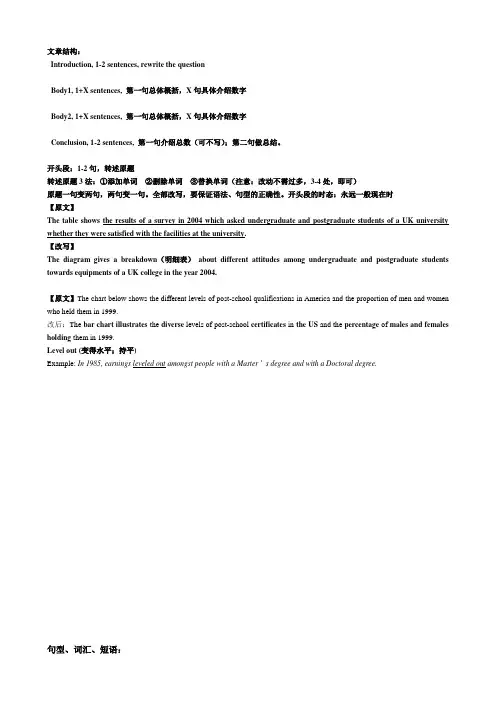
文章结构:Introduction, 1-2 sentences, rewrite the questionBody1, 1+X sentences, 第一句总体概括,X句具体介绍数字Body2, 1+X sentences, 第一句总体概括,X句具体介绍数字Conclusion, 1-2 sentences, 第一句介绍总数(可不写);第二句做总结。
开头段:1-2句,转述原题转述原题3法:①添加单词②删除单词③替换单词(注意:改动不需过多,3-4处,即可)原题一句变两句,两句变一句。
全部改写,要保证语法、句型的正确性。
开头段的时态:永远一般现在时【原文】The table shows the results of a survey in 2004 which asked undergraduate and postgraduate students of a UK university whether they were satisfied with the facilities at the university.【改写】The diagram gives a breakdown(明细表)about different attitudes among undergraduate and postgraduate students towards equipments of a UK college in the year 2004.【原文】The chart below shows the different levels of post-school qualifications in America and the proportion of men and women who held them in 1999.改后:The bar chart illustrates the diverse levels of post-school certificates in the US and the percentage of males and females holding them in 1999.Level out (变得水平;持平)Example: In 1985, earnings leveled out amongst people with a Master’s degree and with a Doctoral degree.句型、词汇、短语:As shown in the first/second …….. ,According to the …….. ,Overall, it can be seen thatThis table shows a striking difference/similarity betweenThe most striking feature of the graph is the sudden increase in the popularity in the computer games.Another fact worth noticing in the graph is that …….后面接完整的句子如果要跟名词不加thatAnother fact worth noticing in the graph is the high cost of fuels.The most remarkable point is that …….The graph shows the difference between the percentages注意用复数of males and females doing full-time jobs.在表示百分数时可以用percent或percentage percentage的一个意思就是百分比(名词)就不能直接跟在数词后面,要表示"百分之36"时,只能说"a PERCENTAGE of 36" 而不是"36 PERCENTAGE"(因为percentage只能作名词);前者用法是: 数词+percent+of+sth;这时后面谓语的单复数以percent后面跟的主语为主,例如:2 percent of the apples(这里是复数的可数名词) are(所以用复数) eaten.2 percent of the apple(这里是单数,指的是一个苹果的一部分) is(用单数) eaten.2 percent of the water(这里是不可数名词) is(单数) drunk.后者的用法是The percentage of +sth+ is, 注意这里不管后面跟的是什么词,都用is(这里忽略别的时态)1.The percentage of the students is 46.2.The percentage of the water is 46.The size of the population will increase shaply in the future..75.6 percent of the male population over sixteen ... …16岁以上男性人群的75.6%.A small/large proportion of students are ……..In Britain people spent the smallest amount of money on personal + sth.大量 a large/considerable/substantial number of 可数 a large/considerable/substantial amount of不可数少量 a small/limited/tiny number of a few of a small/limited/tiny amount of a little ofLots of /a lot of /plenty of 即可用于可数也可用于不可数过去一段时间内的情况变化,用过去式。
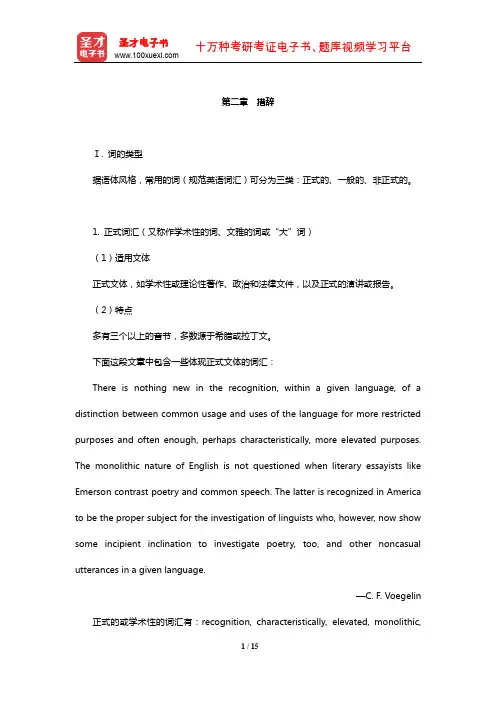
第二章措辞Ⅰ. 词的类型据语体风格,常用的词(规范英语词汇)可分为三类:正式的、一般的、非正式的。
1. 正式词汇(又称作学术性的词、文雅的词或“大”词)(1)适用文体正式文体,如学术性或理论性著作、政治和法律文件,以及正式的演讲或报告。
(2)特点多有三个以上的音节,多数源于希腊或拉丁文。
下面这段文章中包含一些体现正式文体的词汇:There is nothing new in the recognition, within a given language, of a distinction between common usage and uses of the language for more restricted purposes and often enough, perhaps characteristically, more elevated purposes. The monolithic nature of English is not questioned when literary essayists like Emerson contrast poetry and common speech. The latter is recognized in America to be the proper subject for the investigation of linguists who, however, now show some incipient inclination to investigate poetry, too, and other noncasual utterances in a given language.—C. F. Voegelin 正式的或学术性的词汇有:recognition, characteristically, elevated, monolithic,investigation, incipient, inclination, noncasual, utterances等。
CET 4WritingBig Day●Dec. 22nd. 9:00-11:20●Full score:●100 (original score),710 (standard score)●Pass line:●60 (orig. sc.), 425 (std. sc.)●Steps:●9:10-9:40 Writing (15 points, 30 minutes)●9:35 handing out Question Sheet for Speed Reading●9:40-9:55 Speed Reading (10 points, 15 minutes)●9:55 handing in Answer Sheet 1 (writing and speed reading)●10:00-10:35 Listening (35 points)●10:35-11:20●Comprehensive Reading (25 points),●Cloze (10 points)●and Translation (5 points)●11:20 handing in Answer Sheet 2Oral English exam:●If your final score on Dec. 22nd is more than 550, you are qualified to take part in the CET 4Oral English Exam in Next May.Writing●Requirements:● 1. Word limit: about 120 words.● 2. Genre: an essay based on a fixed outline, with your viewpoint/ comments, and facts/examples.● 3. Assessment: see the evaluation form● 4. Suggestion for you: to focus on updated news and hot topics, and to have a critical mind.评分标准:●14分——切题。
小学五年级英语作文复习要点1. 语法- 五年级英语作文要求掌握基本的语法知识,包括动词的时态、名词的单复数和代词的使用等。
- 时态:现在时、过去时和将来时。
- 名词的单复数:可数名词和不可数名词的区分,以及名词的复数形式。
- 代词的使用:主格、宾格和所有格的区别。
2. 句型结构- 五年级英语作文中要求运用简单的句型结构,如主谓结构、主谓宾结构、There be 句型等。
- 主谓结构:主语和谓语构成简单的句子,如 "I like apples."。
- 主谓宾结构:主语、谓语和宾语构成简单的句子,如 "She eats ice cream."。
- There be 句型:表示存在或出现的句型,如 "There is a cat in the garden."。
3. 词汇- 五年级英语作文要求积累一定的词汇量,包括常见的名词、动词、形容词和副词等。
- 名词:天气、动物、食物、人物等。
- 动词:吃、喝、玩、读等。
- 形容词:大、小、快、慢等。
- 副词:很、非常、有时候等。
4. 内容表达- 五年级英语作文内容要求简单而生动,表达自己的思想和观点。
- 可以以日常生活为主题,描述自己的一天、一次旅行、一次活动等。
- 注意使用简单的词汇和句子结构,避免复杂的表达和长句子。
5. 语言准确性- 五年级英语作文要求注意语言的准确性和流利性。
- 注意动词的时态一致,名词和代词的单复数一致,形容词和副词的用法准确。
- 可以通过多读多写来提高语言的准确性和流利性。
以上是小学五年级英语作文复习的要点,请同学们按照这些要求进行复习和练习,提高英语写作能力。
加油!。
作文英语笔记整理模板一、词汇。
积累方式:词根词缀分解。
阅读文章、词汇书。
使用在线词典。
分类整理:词性(名词、动词、形容词、副词)。
主题(如学术、文化、科技)。
使用频率(高频、中频、低频)。
二、语法。
归纳总结:语法规则、句型结构。
时态、语态、语气的变化。
分类整理:词类。
从句类型(名词从句、形容词从句、副词从句)。
条件结构(if 从句、unless 从句等)。
三、短语。
积累方式:阅读文章、背诵范文。
使用在线短语库。
分类整理:动词+介词。
名词+形容词。
名词+名词。
四、句型。
分析归纳:常见句型结构。
修饰语的用法。
句子成分的排列。
分类整理:简单句、复合句、复杂句。
陈述句、疑问句、感叹句。
主谓宾句、被动语态句。
五、作文素材。
积累方式:阅读文章、时事新闻。
观察生活、记录见闻。
收集名言警句、谚语。
分类整理:主题(如教育、环境、科技)。
类型(如事例、论据、论点)。
使用频率(频繁使用、偶尔使用)。
六、作文提纲。
结构规划:确定中心思想。
划分段落。
内容展开:分点列出段落要点。
组织证据、论据。
衔接过渡:使用连接词、转折词。
保证文章逻辑清晰。
七、写作技巧。
词汇运用:使用准确、丰富的词汇。
避免重复、冗余。
语法准确:遵循语法规则。
注意时态、语态、语气的变化。
句式多样:使用不同类型的句子和从句。
避免句式单调。
修辞手法:使用比喻、类比、引用等修辞手法。
增强文章表现力。
八、评分标准。
内容,中心思想明确、观点有理有据、论证充分。
语言,词汇丰富、语法准确、句式多样。
结构,组织严谨、层次分明、衔接流畅。
技术,正确使用格式、标点符号、段落缩进。
九、其他。
定期复习,定期复习笔记,巩固所学知识。
主动思考,自觉分析笔记内容,提出疑问并寻求解答。
持续累积,不断积累词汇、语法、素材等,丰富英语知识。
考研英语写作笔记写作一、写作三大原则1.V:vary原则2.I:input原则3.P:practice原则①所有不会写的单词都写成自己会的词汇,务必保证正确;②所有不会写的长难句都写成简单句,务必保证正确。
二、小作文一)公务书信——关于投诉1、称呼:①文中已给出,直接用即可;②文中未给出;2、第一段:自我介绍+写作目的3、第二段:按照写作要求来写4、第三段:表示感谢+期待回信5、落款二)公务书信——关于感谢Dear my friend,I'm so delighted to hear that you decide to take part in the examination of postgraduates. now, I just give you some suggestions about the major. For my part, English may be your favorable choice.First, you love English and I think interest is the best teacher. then, if you learned English as your main course, you would become an English teacher who can help so many Chinese to realize their dreams。
at last, possibly, you could go abroad to teach foreigners how to study Chinese, as is a fantastic idea.So you could consider my suggestion carefully, and make a prudent determination to have a bright future.yours trulyLi Ming三)公务书信模板Dear sir or madam,第一段I am senior who majors in physical education in the/a university. The reason why I am writing the letter, to be honest, is in order to +文中已给出的目的,直接抄。
做到英文作文复习笔记英文,When it comes to reviewing notes for an English essay, there are several things that I find helpful. Firstly, I like to go through my notes and highlight any key points or ideas that I want to include in my essay. This helps me to stay focused and ensures that I don't miss anything important.Secondly, I find it useful to create an outline for my essay. This allows me to organize my thoughts and ensures that my essay has a clear structure. I usually start with an introduction, followed by several body paragraphs and a conclusion.In addition, I like to review any vocabulary or grammar rules that are relevant to my essay topic. This helps me to ensure that my writing is clear and concise, and that I am using the correct language.Finally, I find it helpful to practice writing essays.This allows me to apply the skills and knowledge that Ihave learned, and to identify any areas where I need to improve.中文,当我复习英语文章笔记时,我发现有几个方法是很有帮助的。
WritingUnit 1 (1)1. Narration (Personal Narratives) (P1-2) (1)2. Coordination & Subordination (P12) (1)Coordination (1)Subordination (2)Unit 2 (2)1. Decription (Places)(P21-22) (2)2. Parallelism (P31-32) (3)Unit 3 (3)1. Narration (Objective Reports) (P42) (3)2. Action verbs &Active verbs (P52) (3)Circumstances of using passive voice (3)Unit 4 (4)1. Description: objects (P64) (4)2. Variety(多样性)(P76) (4)Unit 5 (5)1. Narration: chain of action (P82) (5)Showing &telling in narration (5)2.Task 未教(P93) (6)Unit 6 (6)1. Description: People (P102) (6)2. Effective Sentences: Conciseness 简明,简洁(打印) (6)Unit 7 (7)1. Narration: Historical Narratives (P126) (7)Unit 8 (8)1. Personal Letters (P150) (8)- Unit 11. Narration (Personal Narratives) (P1-2)1)Types :personal experience/imaginative fiction/historical narrative2)How to write:①A topic sentence②First person point of view③In chronological order④Using transitions⑤Vivid details2. Coordination & Subordination (P12)Coordination1)Definition :combine ideas/create equal emphasis2)How to coordinateWords &phases :①A coordinating conjunction②A pair of correlative conjunction③In the same kind of grammatical constructionClauses ①“,”+”fan boys”②“;”+”conjunctive adverbs”(however)3)Coordination- Subordination1)Definition :combine ideas/create unequal emphasis2)How to subordinatesubordinate clauses :①Subordinating conjunction②Relative pronouns◆Phrase or single wordsUnit 21. Decription (Places)(P21-22)1)Definition: a word picture2)Types :◆objective: no any personal comment◆Subjective: free to interpret details3)Methods of organization:①Using the sense (look ,smells ,sounds)②Using the spatial order(空间顺序)③Using chronological order4)Tips :On a dominant impression (主要印象)Don’t use too many adjectives and adverbsPrecise nouns and vivid verbsDon’t qualify every noun with adjective- 2. Parallelism (P31-32)1)Definition :Express equally important ideas in the same grammatical form2)types :①parallel words (gerund 动名词,nouns ,verbs)②parallel phrases (prepositional phrases, verb phrases)③parallel clausesUnit 31. Narration (Objective Reports) (P42)1)Types :First person :“I”she””they”Third person: “he””2. Action verbs &Active verbs (P52)1)Tips:①replace the verb” be”②Don’t overuse the pattern ”there be”③Use the active voice instead of the passive voice(被动) Circumstances of using passive voice①The performer of an action is unknown or too well-known-②Emphasize the recipient (接受者)want to mention the performer③You don’tUnit 41. Description: objects (P64)1)Methods of organization:①Using the sense (look ,smells ,sounds)②Using the spatial order(空间顺序)③Listing functions④Using chronological order2)Tips on how to describe an objectshow you got the objectBasic factual information(size, shape, texture<质地>)Useful featuresFocus on the most important of the objectWhy it is importantYour feeling (how you like it)2. Variety(多样性)(P76)1)How to use sentence varietyVary sentence openingVary sentence structure- Invert sentence(倒装句) occasionally2)TipsPut a adverb before the subjectPut the verb or direct object before the subjectBegin with a prepositional phrase, or an infinitive phraseUnit 51. Narration: chain of action (P82)Showing &telling in narrationTell a story1)Showing:dramatizing a scene and creating a dialogueMake it more vividUsed in a short narrative relating a single event2)Telling :summarizing what happenedInclude a greater number of events and detailsIn longer narratives ,used along with “showing”- 2.Task 未教(P93)Unit 61. Description: People (P102)1)How to describe a personDominant impression approach (P22)Select details but don’t give too muchConcrete vivid detailsDon’t overload adj. adv.More showing than tellingUse anecdotes(趣事)2)Ways of organizing a descriptive essay about a personFocus on one feature or quality/use anecdotesDescribes from appearance and personalityList a few characteristic features/explain briefly2. Effective Sentences: Conciseness 简明,简洁(打印)Reduce long clauses to shorter phrasesReduce phrases to single wordsAvoid there beDon’t overuse “very, really, totally and other modifiers”Eg. Very tired exhausted/ really hungry famishedReplace redundant(多余的) expressionsEg.in the event that if/oval in shape ovalRemove nominalizationsVerb a/an noun verbEg. Give an analysis of analyzeUnit 71. Narration: Historical Narratives (P126)1)Summary paragraphsA typical paragraph:?develop an idea;?The topic sentence + supporting sentencesThe summary paragraph:?Consist of simple facts or conclusions withoutexplanation or evidence2)Basic structure of a historical narrativeOpen with a brief introduction of the person or organizationProvide a brief account of major phases/events,particularly turning pointsConclude with a remark to summarize or to emphasize aspecific pointUnit 81. Personal Letters (P150)1)Layout/FormatDate / salutation /body/closing/signature2)LanguageSimple, clear and straightforward sentenceInformal/colloquial wordsContractionsLinking words or phrases3)OrganizationBegin by asking how he/she is getting on/refer to currentcorrespondenceTalked your shared interestsState the purposeEnd your letter with a friendly phrase of some kind。
1.修辞手法1.Simile 明喻Eg. O my love's like a red,red rose.That man can not be trusted.He is as slippery as an eel 黄鳝She likes an apple in her eyes.2.Metaphor暗喻Eg. The picture of those poor people's lives was carved so sharply in his heart that he could never forget it.There was a medieval magnificence about the big dining hall.The street faded into a country road with straggling houses by it.There was a few lordly poplars before the house.All his former joy was drowned in the embarrassment and confusion he was feeling at the moment.Independent would not be a trial seperation,but would be a painful divorce.3.Personification 拟人Eg . Youth is hot and bold,age is weak and cold.The match will soon be over and defeat is staring us in the face.The storm was raging and an angry sea was continuously tossing抛their boat.4.Metonymy 借喻转喻不直接说明而是以另外一个与之相关的事物来说明Sword and cross in hand,the European conquerors fell upon the Americas.When the war was over,he lay down the sword and took up the pen.弃武从文His purse钱包would not allow him that luxuryThe kettle boils 水开了The room sat slient. 全屋人安静的坐着。
Lend me your ears , please. 请听我说。
His unfriendly tough surprised her.5.Synecdoche.提喻A.部分代整体或者说特殊代一般Eg . He is the Newton of this century.The had to earn his daily bread by doing odd jobs.打零工面包来代指生活收入The farms were short of hands during the harvest season. 手代指人There are about 100 hands working in the factory. 同上B.整体代部分或者一般代特殊Eg. The fox(狐狸来代指狐狸的毛皮) goes very well with your cap.帽子Germany beat Argentina 2 to 1 in this exciting football match.用德国和阿根廷来代指两个国家的球队The poor creature could not endure her sufferings.用生物代指人6.Euphemism 委婉,诲饰Eg. He is out visiting the neccessary. 他出去方便了。
His relation with his wife has not been fortunate. 他和他妻子离婚了。
Deng xiaoping passed away in 1977.注意看课本page19页的词的委婉用法。
7.Irony 反语Eg. It would be a fine thing indeed not knowing what time it was in the morning.早上没有时间观念还真是好事。
实际上是运用反语说应该有时间观念。
8.Overstatement 或hyperbole 夸张and Understatement缩小,低调陈述A.Overstatement的用法Eg. I beg a thousand pardons. 我非常抱歉。
When she heard the bad news,a river of tears poured out.当他听到噩耗,眼泪如江水一般汹涌流出。
She is dying十分to know what job has been assigned her.On hearing that he had been admitted to that famous university,he whispered to himself,"I'm the luckiest man in the world."B.Understatement 的用法Eg. It took a few dollars to build this indoor swimming pool.建室内游泳池只花了一点小钱。
"He is really strange,"his friends said when they heard he had divorced his pretty and loving wife. Strange在此是低调陈述,实际上是说he is very stupid and crazy. 9.Transferred Epithet 移就用本来应该修饰人的形容词来修饰物或者其他的东西,大多是把表达人的思想观念的词语移用于其他物体上面。
英语移就格的特征:转移形容词+ 中心语。
要注意与拟人的用法区分开,从内容上看,“拟人”重在把物人格化,就是把事物当作人来描写;“移就”则是把甲性状词语移属于乙,重在移而就之,它不把事物人格化,也就是不把事物当作人来描写。
Eg. She was so worried about her son that she spent several sleepless nights.她太担心他的儿子以至于她整晚难眠。
Sleepless本身是指人睡不着,在此却修饰了nights夜本身无所谓眠不眠,不眠的只是人而已。
In his quiet laziness he suddenly remembered that strange word. Quiet 本是形容人的安静在此形容laziness 指人懒The assistant kept a respectful diatance from his boss when they were walking in the corridor.He said yes to the question in an unthinking moment.The old man put a reassuring劝慰人的hand on my shoulder.老人拍了拍我的肩膀。
She has expensive tastes in clothing.I was surprised to find him living in such drab and cheerless surroundings.10.Oxymoron 矛盾修饰法,反意法,逆喻Eg. The coach had to be cruel to be kind to his trainees.严格是对队友好When the news of failure came ,all his friends said that it was a victorious defeat 虽败犹荣The president was conspicuously非常显眼的absent on that occasion.11.Alliteration 押韵,渐降法Eg.Long and loudly little Lily laughed.The windows waved violently in the wind.Drain your sweat--nay,drink your blood?I see also the dull,drilled,docile,brutish masses of the Hun soldiery plodding on like a swarm of crawling locusts.12.Synaesthesia 通感The birds sat upon a tree and poured forth their lily like voice.由视觉转移到听觉鸟儿落在树上,倾泻出百合花的声音。
Taste the music of Mozart.品味莫扎特的音乐。
13.排比14.Pun 双关Eg. If we don't hang悬挂together,we shall hang绞死separately.15.Parody 仿拟是指模仿名言警句和谚语等。
Eg. Rome is not built in a day nor a year.A friend in need is a friend to be avoided.16.Rhetorical qustion 反义疑问句Eg.You are staying,I'm going.Give me liberaty,or give me death.17.Antithesis 对照是指意义完全相反的两个语句排在一起比较。
2.句子The Sentence1.句子结构S+V.S+V+OS+V+O2间接宾语+O1直接宾语S+V+O+OC宾语补足语S+LV连系动词+N名词eg. I'm a student.S+LV+A形容词eg. I'm happy.S+V+O+A eg. We find the work difficult.ma fault 逗号拼接句两个完整的句子是不能用逗号连接的Eg. Faulty: It was raining hard,they could not work in the field.Improved: It was raining so hard that they could not work in the field.Faulty: I was born in a small town, in the town there was only one school,I studied there for six years.Improved: I was born in a small town, where there was only one school.I studied there for six years.I studied for six years at the only school in the small town where I was born.Faulty: The essay is poorly organized, there is no central idea.Improved: The essay is poorly organized; there is no central idea.3.句子类型Types of Sentence.A.按照用法分为Declarative 陈述句Interrogative 疑问句Imperative 祈使句and Exclamatory Sentence.感叹句B.按照句子结构可分为以下四种a.Simple 简单句pound 并列句指包含两个或多个用连词或者分号(and,but,or,etc.)连接的独立完整的句子。